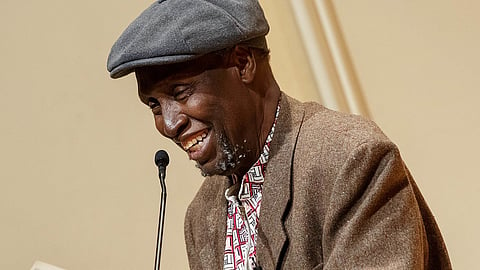

NEW DELHI: In literature, life, and language Kenyan legend Ngugi wa Thiong'o was always off centre, pursuing directions away from canonisation. He died this Wednesday in the US at the age of 87, but his works will ensure he lives forever.
Ngugi's prose was militant. He thought the writer's job was to be in the 'Opposition'. He held no brief for elites, which emerged in his country, Kenya, after independence, because they were no less oppressive and exclusionary than the British masters they had replaced. He emerged as a bitter critic of the governments that came in the wake of Kenya’s independence in the early ’70s. He was perennially a Nobel Literature hopeful, but did not expect it.
Though with Chinua Achebe and Wole Soyinka, he was one of big boys of post-independence African literature, his position against the structures of the world that was White had always been too forthright; his steady stream of novels, plays and essays on questions of land, labour and language, showed he would not 'drop it'.
His fiction is peopled with characters like Matigari, a man who will eschew words and take up arms to 'renew' the freedom struggle, and Njoroge, a boy-scholar who starts out believing in progress by education but whose hopes are dashed in the background of tensions between Kenya's White settlers and the militants of the Mau Mau revolt.
Ngugi in person
It was the summer of 2018. Ngugi wa Thiong’o had been in exile from Kenya for over 30 years. He was in Delhi for a talk on translation which I was covering.
His first greeting was a hug. In his Hawaiian shirt, he gamely posed for photographs and then settled down for a long interview at the time that tested his publisher Naveen Kishore's patience; Kishore had been waiting to whisk him away for a dinner at historian Romila Thapar's home.
But after sussing out his India connections—Ngugi had written an introduction for poet and Maoist ideologue Varavara Rao's book Captive Imagination: Letters from Prison and his memoir, Dreams in a Time of War, had just then been translated into Telugu—we were onto how in high school, he saw a library for the first time, his late appreciation of the Mahabharata, and was warming up to his 'position' as a language warrior when the inevitable knock on the door cut the interview short. Over e-mails we finished the rest.
The spotlight on translations today also recalls Ngugi's batting for his and everybody’s mother tongue and the need for literature in that language.
Wrote the first East African English novel
His novel, Weep Not, Child in English, published in 1964, was the first East African English novel but he decided to write in Gikuyu after he was jailed in 1977.
His position was simply this. He was neither anti-Shakespeare or anti-Dickens, nor did he see them as 'White literature', but he did not want it to be central to the universe of imagination all around the world.
Ngugi was a prose stylist in English. But the gist of what he told me that day, when asked if he was never going to write in English again, can be best summed up in the words of Bartleby, that most diffident and subversive character of Herman Melville. He would simply 'prefer not to'.